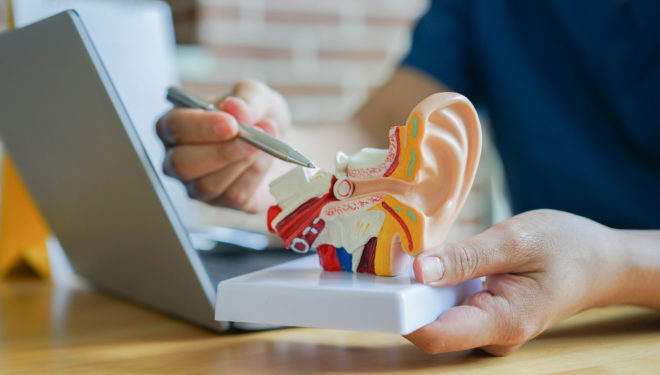The Connection Between Hearing Loss & Dementia
Learn More About Hearing Loss Risks for Patients in Fort Wayne, IN
We don’t typically think about what we do in the present, causing issues in the future, especially regarding our hearing health. Whether you listen to the TV at a high volume, attend live music concerts frequently, or work in a noisy environment, it’s essential to understand the consequences of exposing yourself to loud sounds. A 12-year study by Johns Hopkins researchers determined there’s a connection between hearing loss and an increased risk of developing dementia. While the exact nature of this connection is still being explored and understood, the studies suggest that hearing loss can change the brain in two ways: brain overload and brain atrophy.
Below, the experts at Lowe Audiology discuss the connection between hearing loss and dementia and what you can do today to prevent your risk of developing hearing loss in the future. Our hearing care professionals provide all the services you need under one roof, from custom hearing protection to tinnitus treatment for patients throughout Fort Wayne, IN and the surrounding areas. Contact the team at Lowe Audiology today to learn more about preventing, addressing, and treating hearing loss.
How Are Hearing Loss & Dementia Connected?
Whether you have sensorineural hearing loss or conductive hearing loss, it’s essential to address the issue with a hearing care professional to determine the specifics of your condition. When your brain works harder to process the sounds you’re hearing, its normal structure is changed over time, contributing to cognitive decline and characterized as brain atrophy.
Hearing Loss & Brain Atrophy
When the parts of your brain responsible for hearing aren’t stimulated regularly by everyday sounds, they become less active. Over time, this can significatly change your brain’s structure and functioning, referred to as brain atrophy. This is similar to muscles shrinking when they’re not being used.
Hearing Loss & Brain Overload
Brain overload represents the link between a patient’s hearing loss and Alzheimer’s. When it’s difficult to hear clearly, your brain must work harder to understand what’s being said, which direction the sounds are coming from, and other critical auditory factors. Over time, this constant strain can exhaust the mental energy needed for crucial cognitive functions, including problem-solving and memory. The combination of hearing loss and your brain’s straining to understand the sounds around you can lead to further cognitive decline.
Is It Hearing Loss or Dementia?
Hearing loss can increase the risk of dementia and Alzheimer’s, but it’s essential to understand the risk of misdiagnosis. Many patients with hearing loss exhibit the same type of characteristics as someone with dementia, including the following:
- Forgetting something that someone just said
- Misunderstanding someone when they tell a story or explain something
- Acting confused about verbal instructions
How Can Hearing Aids Help?
While there’s no cure for dementia or Alzheimer’s, hearing experts hearing aids can effectively slow the rate of cognitive decline and improve the quality of life for those with hearing loss and dementia. Hearing aids also allow you to hear those around you more clearly, lessening the risk of feeling isolated socially or depressed. Modern hearing aids are available in a wide range of styles and types to suit a variety of lifestyles and types of hearing loss.
The Importance of Protecting Your Hearing
Protecting your hearing is integral to preventing hearing loss and decreasing your risk of developing dementia. Below, we’ve included some tips to help you properly protect your hearing and address any signs of hearing loss.
Reduce or Eliminate Exposure to Loud Noises
Not all loud sounds can be avoided entirely, especially if exposed to them at work. However, you can get custom hearing protection prescribed to fit your specific lifestyle and environmental needs. When you’re at home, keeping the volume turned down on the TV and while listening to music is essential. As you age, the impact of loud noises accumulates, increasing the risk of irreversible hearing loss.
Schedule Regular Hearing Exams
Scheduling regular hearing tests is an important part of staying on top of your hearing health. Today, patients can take a basic hearing test online from anywhere they have internet access. However, if you suspect you have hearing loss, you should complete a comprehensive hearing evaluation with a trained audiologist or other hearing care professional to determine the exact status of your hearing health.
Address Hearing Problems Early
Modern hearing aids are discreet, comfortable, and can be connected to your smart devices for an enhanced experience. It’s possible to purchase over-the-counter hearing aids for affordability, but you’ll get the most benefit from your devices if an audiologist or hearing care professional prescribes them. Hearing aids can be crucial in reducing the impact of dementia or slowing its progression.
Contact Lowe Audiology Today
The connection between hearing loss and dementia has been explored by hearing experts and researchers throughout the years, giving us a deeper understanding of the importance of addressing the signs of both conditions. The clinical team at Lowe Audiology offers all the services you need under one roof, ensuring a positive journey towards better hearing health.
If it’s been a while since you’ve scheduled a hearing evaluation or you think it’s time to update your hearing aids, our hearing experts are here to help each step of the way in Fort Wayne, IN and the surrounding areas. Contact us today to learn more about treating hearing loss among patients with dementia, or schedule an appointment online for a one-on-one consultation.



